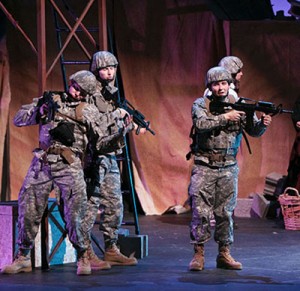Most people are fortunate to find themselves unburdened by the horrors and tragedies that come with war. Often times, veterans return home with scars both inside and out.
 The Forest Roberts Theatre’s production of “Fallujah,” written by Evan Sanderson and directed by theatre professor Ansley Valentine, explores the difficulties of adjusting after the war in Iraq.
The Forest Roberts Theatre’s production of “Fallujah,” written by Evan Sanderson and directed by theatre professor Ansley Valentine, explores the difficulties of adjusting after the war in Iraq.
The play follows the experiences of a journalist, played by senior English writing major Max Peterson, embedded in a Marine unit as he documents their lives. When he returns home, he finds time in Iraq has changed the person he once was.
“The lines between home life and war begin to blur,” Peterson said. “Subsequently the lines distinguishing reality start to blur for him.”
According to the National Center for Post-traumatic Stress Disorder (PTSD), 10 to 18 percent of troops returning from Operation Enduring Freedom or Operation Iraqi Freedom are likely to have PTSD after they return from serving in active duty. PTSD can occur after combat exposure or physical assault, and can lead to vividly re-experiencing the event and hyperarousal. Those with PTSD may also experience feelings of hopelessness, shame, despair, depression or anxiety, as well as problems with substance abuse.
Preparing for the role was different than previous productions, Peterson said. In addition to physical training, Peterson said the cast did extensive research to prepare for the role, including watching documentaries, live footage of Marines in action and speaking to veterans who suffer from PTSD.
“We really wanted to express the story as best we could,” Peterson said. “We knew that there could be someone in the audience who lived through something like this.”
For Darin Casler, who plays “Marine Three” in the play, preparing for the role largely revolved around considering his personal limitations.
“None of us are Marines, or know what that could be like to actually be there,” Casler said.
“I tried to put myself in those situations, not so much try to imagine myself as a Marine.”
The city of Fallujah, which lies 43 miles west of Baghdad, drew international attention in 2004 when four American security contractors were pulled out of their vehicles, mutilated and set on fire. Their corpses were hung from a bridge over the Euphrates River, and the subsequent broadcast of the event caused major disrest in the United States.
Casler said people coming to the play shouldn’t be expecting action and gunfights, but rather an in-depth look at some of the issues surrounding war.
“People should keep an open mind, [“Fallujah”] is definitely R-rated,” Casler said. “I think what Sanderson is trying to get across is that at the end of the day, both sides of a war have to go home and cope with a lot of things that can’t be taken back. People who come to the play will have a better appreciation and way of looking at the war and what happens after.”
“Fallujah” will be showing at 7:30 p.m. on Thursday, Feb. 21 through Saturday, Feb. 23, with a 1 p.m. performance on Saturday and all performances will be held in the Forest Roberts Theatre. Tickets are $5 for NMU students, $10 for students 18 and under and $15 for the general public.





























